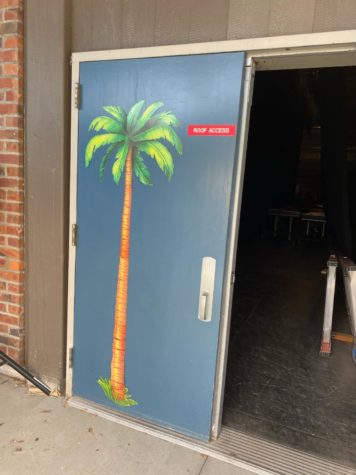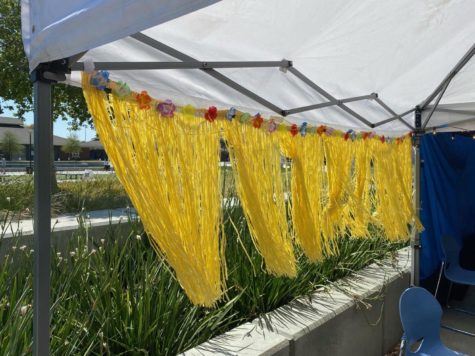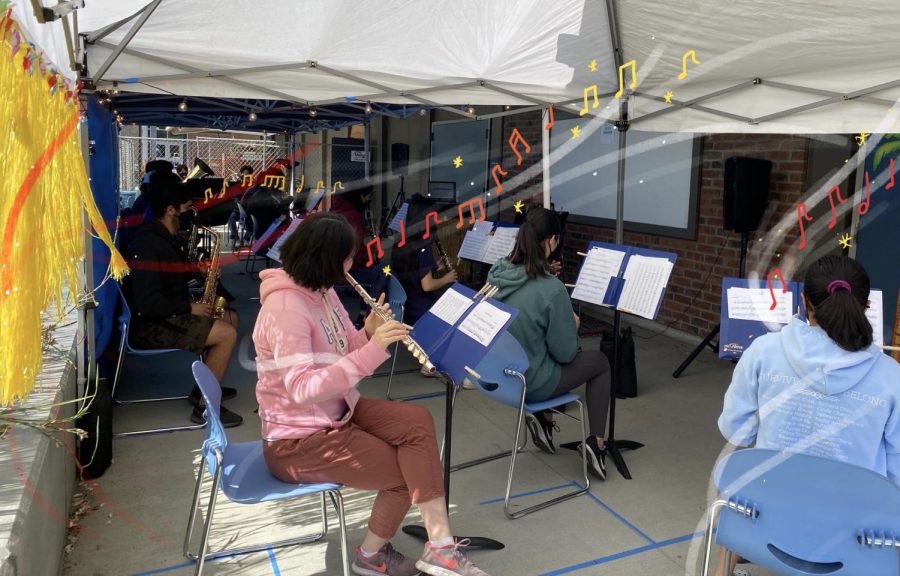String lights, fake grass and a cabana: Lynbrook band’s new home
Mr. Pakaluk’s band class practices in the cabana. (Photo used with permission of Richard Chiu. Graphic illustration by Anwen Huang.)
May 18, 2021
Walking across campus, Lynbrook students attending school in person may come across a peculiar sight: palm trees, grass streamers and tents lining a side of the quad. Known to band students as the “band cabana,” this outdoor space is where band teacher Michael Pakaluk conducts class these days as part of an effort to make the class as fun as possible under the unique circumstances of hybrid learning.
Made of four connected tents, the cabana is situated in the quad under the auditorium awning. The idea to use the tents first came out of practical concerns. With the weather warming up and county guidelines indicating that band classes would have to take place outdoors, Pakaluk felt it was imperative to have a covering for himself, the students and their instruments, some of which work poorly under hot temperatures. He set up a sophisticated sound system with speakers that would play background tracks and installed a high-quality microphone that would relay the sound of in-person playing through Zoom for remote students. For seating, he organized the instruments in a way so that their volume differences would be balanced — quieter instruments were seated closer to the microphone while louder ones were seated farther. Once he had logistical considerations taken care of, Mr. Pakaluk began to think of ways to make the space more enticing.

Over the spring break, he purchased a variety of tropical-themed decorations to embellish the tents and went on campus to set them up, creating the unique cabana now on campus. String lights line each tent and provide subtle mood lighting. On his tech cart, where he keeps his computer and microphone, as well as on the back of the tents, Mr. Pakaluk has added tiki grass and fake flowers. A palm tree sticker adorns the door to the band room. For Mr. Pakaluk, these creative measures have been his way of making band in the era of COVID-19 as fun as possible.
“I wanted to keep it low stress,” Pakaluk said. “We’re not working toward any concerts in the immediate horizon, so we’re just trying to kind of break up the day by playing a little music in a fun, cozy setting.”
Since the start of in-person learning on April 19, on-campus band students have begun each class period by filing into their respective sections in the tents. They then practice songs, guided by either pre-recorded tracks or Mr. Pakaluk’s conducting. Sometimes, Mr. Pakaluk joins in by playing along with his trumpet. To prevent the spread of COVID-19, all instruments are played with cloth covers and students wear specially designed masks with mouth holes.
The setup has quickly become a fun highlight of the school day for students experiencing band in-person. In contrast to the traditional setting of their other classes, this environment is an energizing and much-needed shift in scenery.

“I like the cabana,” said senior Richard Chiu, who has been attending band in person. “Mr. P is trying his hardest to make band fun, and it feels less like a class and more like a place where I can relax. My favorite part is just chatting with everyone, seeing the same people from previous years again and playing together — it’s always fun to play music together.”
Even for students choosing to stay online, the cabana has added to their experience. When school was fully remote, all band students had to stay on mute and play without the accompanying sounds of their peers. This created a sense of detachment and students had little way of knowing how their part was meant to sound in unison with others. Now, with a camera and microphone aimed at the cabana, students on Zoom are able to see, hear and play along with those in person. Although still not the same as a fully in-person band experience, this new structure has created a feeling of unity and inclusiveness for remote students.
“When we were fully remote, it was really lonely because we were not playing along with anyone and didn’t know how everything was supposed to sound,” said junior Faith Ju, a band student who has chosen to stay online. “Even though I’m still remote, band now is much more fulfilling and closer to what the real-life band experience would be. It’s been a big leap from what we had before.”
At the end of each period, the students on Zoom log-off, and those in-person pack up their instruments. Mr. Pakaluk dismantles his tech cart and the band re-enters the familiar brick campus. Another day in the cabana has provided them refreshing deviance from the screens and monotony of digital learning. Most importantly, it has given them the opportunity to do what they love most even in trying times.
“This whole year has been a challenge, but the cabana is way better than Zoom and I’m enjoying doing more than simply looking at computer screens,” Pakaluk said. “I’m just happy to be back making music, even if it’s only with some students.”




























































